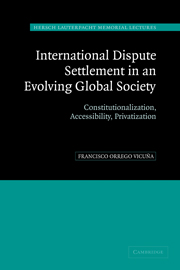 International Dispute Settlement in an Evolving Global Society
International Dispute Settlement in an Evolving Global Society Book contents
- Frontmatter
- Contents
- Preface
- Acknowledgements
- List of abbreviations
- Table of treaties
- Table of cases
- 1 An evolving international society: institutionalization, privatization, globalization
- 2 A constitutional court for an international society?
- 3 Individuals and settlement of international claims: change and adaptation of governing rules
- 4 Individuals before international courts and tribunals: a continuing progression
- 5 Shaping a new role for the individual in international dispute settlement: the contribution of specialized jurisdictions
- 6 The World Trade Organization integrated dispute settlement system: innovation and transition
- 7 An alternative dispute resolution system for international disputes
- 8 A centralized-decentralized dispute resolution system for the international community?
- Bibliography
- Index
7 - An alternative dispute resolution system for international disputes
Published online by Cambridge University Press: 04 August 2010
- Frontmatter
- Contents
- Preface
- Acknowledgements
- List of abbreviations
- Table of treaties
- Table of cases
- 1 An evolving international society: institutionalization, privatization, globalization
- 2 A constitutional court for an international society?
- 3 Individuals and settlement of international claims: change and adaptation of governing rules
- 4 Individuals before international courts and tribunals: a continuing progression
- 5 Shaping a new role for the individual in international dispute settlement: the contribution of specialized jurisdictions
- 6 The World Trade Organization integrated dispute settlement system: innovation and transition
- 7 An alternative dispute resolution system for international disputes
- 8 A centralized-decentralized dispute resolution system for the international community?
- Bibliography
- Index
Summary
The public system of international adjudication performs an essential function in the settlement of disputes, both in inter-state relations and in a number of situations that involve individuals and other private parties. However, as has been shown in the preceding chapters, there is a constant need to facilitate dispute settlement in a broader context, particularly in so far as disputes increasingly involve private interests in a global market, regardless of whether states or other private parties are involved. This has led to the development of an alternative dispute resolution system for intermational disputes. This system is already one of the central features of international society and will no doubt be further developed in the years ahead. This chapter will examine some of the recent improvements in this field, explore some relevant domestic experiences and their possible influence on international developments, and present some proposals on how these developments might evolve into a structured system interconnected with public courts and tribunals.
Enhancement of an international alternative dispute resolution system
Alternative dispute resolution has been described in a domestic context as a halfway house between the certainty of the adversarial system and the flexibility of private negotiation. But it does not exclude adjudication in its entirety. In fact, adjudication as a result of arbitration is very much a part of the developing alternative dispute resolution system, as are decisions of a number of tribunals established for different specialized purposes. Only exceptionally has arbitration been excluded from alternative dispute settlement arrangements.
- Type
- Chapter
- Information
- International Dispute Settlement in an Evolving Global SocietyConstitutionalization, Accessibility, Privatization, pp. 98 - 123Publisher: Cambridge University PressPrint publication year: 2004


